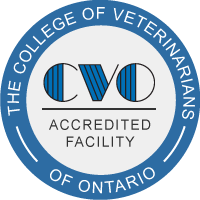|
|
|
As an Independently Owned, Essential Service Provider we are open and our services are running. We take all the measures to protect our clients and ourselves from Covid-19 and to keep our environment safe. Please call us for detailed information!
|
Unionville South Pet Hospital
(905)604-5604
unionvillevet.com
|
Veterinary Diagnostic Testing
RadiographyX-rays can be extremely useful in diagnosing a variety of health problems. At Unionville South Pet Hospital our technicians are trained in safe, proper techniques for taking radiographs using only the amount of exposure necessary to produce excellent diagnostic images. Your pet might need to be sedated in order to ensure the procedure is performed accurately without stress or further injury. For difficult diagnoses, we may need to consult a specialist or another veterinarian for a second opinion. EndoscopyDr. Cheung may recommend endoscopy if your pet is having symptoms such as vomiting, diarrhea, problems swallowing, unexplained weight loss, or has eaten something they shouldn't have. Endoscopy is a minimally invasive way to evaluate the inside of organs such as the esophagus, stomach, intestines, urinary system, trachea, lungs, and nasal cavity. It can also be performed to evaluate the inside of body cavities including the abdomen (laparoscopy) or chest (thoracoscopy). An endoscope is a flexible, tube-shaped device with a camera, microchip and light source at the tip. It's inserted directly into an organ through a natural opening in the body or through one or more small incisions. The camera then sends a high quality image to a computer so Dr. Cheung can view and interpret the condition of the area being examined. The endoscopy procedure must be performed by a veterinarian while your pet is sedated and intubated. If a foreign object is located, another instrument is inserted through the tube and the object is extracted if possible. If the location, size, or texture of the object prevent extraction, surgery may be necessary. The quicker you get your pet to us when you suspect a foreign body, the better the chance of removing it without surgery.
OtoscopyThe endoscopy procedure can also be used to view and thoroughly cleanse ear canals, known as an otoscopy. Your pet will be sedated and a small tube with a camera inserted into the ear canal which can then be viewed on the monitor. The ear canal will be flushed and suctioned for a thorough cleaning, which is particularly helpful for chronic otitis infections that won't clear with regular ear cleaning or when the ear has become too inflamed to successfully treat with medication.
Routine Blood WorkIn addition to a thorough physical exam, routine blood screening as part of your pet’s annual wellness exam helps Dr. Cheung learn more about your pet’s health in order to make the best treatment and prevention recommendations. Blood screening is extremely useful in the early detection of some common conditions such as diabetes, liver disease, kidney failure, and pancreatic issues. It can also help in the diagnosis and treatment of other health conditions including parasites and allergies. If your pet is on certain long-term medications we'll routinely screen their blood to ensure that the medication is working at the existing dosage without causing any serious side effects. In most cases we'll perform blood screening on your pet every six months. At the beginning of treatment or if your pet's health changes we may need to monitor things more closely.
Additional resources https://veterinarypartner.vin.com/default.aspx?pid=19239&id=4952958 https://veterinarypartner.vin.com/default.aspx?pid=19239&id=4952036 https://veterinarypartner.vin.com/default.aspx?pid=19239&id=10038941
|





